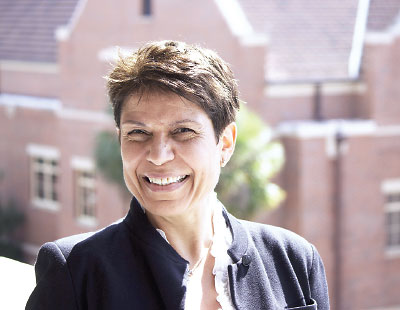Leadership Program Encourages Residents, Fellows to Advance Equity
Abstract
The Florida Psychiatric Society’s RIPPLE Program works to enhance the leadership skills of chief residents and fellows from across the state. For the 2022 RIPPLE class, discussing leadership meant focusing on how to best manage a diverse workforce, ensuring inclusion and equity for both residents and patients.
When chief residents and fellows step into their roles, they have several years of medical experience under their belts, but many have never received formal leadership training, especially not related specifically to leadership within the field of psychiatry, according to Daniel Castellanos, M.D.
The Florida Psychiatric Society (FPS) has aimed to fill that gap by creating the Residents in Psychiatry Programs: Leadership Experience (RIPPLE). RIPPLE is a certification program completed over the course of three sessions held each year between the spring and fall.
“Our goal is to encourage self-reflection among the participants,” said Castellanos, RIPPLE’s founding program director. “We want them to better understand their own leadership competencies and then build their skills and strengths from there.” Castellanos is also the founding associate dean for graduate medical education and a professor of psychiatry at Creighton University School of Medicine-Phoenix.

The conversations related to diversity, equity, and inclusion arose organically from the chief residents and fellows as they discussed some of the challenges and opportunities they face as leaders, said Ludmila De Faria, M.D.
RIPPLE also encourages the chief residents to understand how advocacy, especially through engagement with APA and FPS, can allow them to effect change for the field and their patients, said Ludmila De Faria, M.D., who is a RIPPLE faculty member, an associate professor in the Department of Psychiatry at the University of Florida’s College of Medicine, chair of APA’s Committee on Women’s Mental Health, and a member of the Psychiatric News Editorial Advisory Board.
RIPPLE’s implementation was delayed by the pandemic. Its second cohort just graduated at the end of 2022, and it reflected the increasing diversity among residents and fellows, Castellanos and De Faria said. RIPPLE is structured so participants are able to discuss their own challenges and accomplishments in small groups. During these small group discussions, the conversations increasingly returned to issues related to diversity, equity, and inclusion.
“There was a lot of talk around, When you have residents who come from diverse backgrounds, what are the best ways to support them? When it comes to working with a diverse patient population, how can we promote health equity and access?” De Faria said. “A lot of the conflict management we talked about had to do with diversity, because right now there is so much polarization in our society that residents don’t know, are afraid, or just simply feel awkward engaging in difficult conversations, whether it is with patients or with peers.”
During the program, residents were encouraged to practice having these conversations “to lift the veil and talk about the roots of the challenges that often come up when we’re dealing with conflict,” De Faria continued.
The conversations, she said, were driven by the participants, several of whom submitted an abstract for APA’s 2023 Annual Meeting about the conversations that came up during their time in RIPPLE. They will present at the meeting during the session “Navigating Leadership in Residency: Trial by Fire.” The session aims to explore the complexities of navigating situations relating to discrimination, racism, and fear of retaliation in residency programs. It will be chaired by Castellanos with presentations by RIPPLE graduates Stéphane Bernard Dégraff, M.D., Prisa Zachariah, M.D., and José Hawayek, M.D.
Further, Dégraff, Zachariah, and Hawayek will lead group discussions about leadership dilemmas and ways in which RIPPLE has enhanced their abilities to address diversity, equity, and inclusion as chief residents.
Zachariah explained how, during her residency, she felt isolated as the only married resident at the time and again experienced isolation as an expectant parent. “I experienced several issues with balancing motherhood and residency,” said Zachariah, who is chief fellow of the Child & Adolescent Psychiatry Program at Citrus Health Network. Her portion of the presentation will focus on maneuvering some of the sexist stigmas she has encountered.
The RIPPLE program gave Hawayek the perspectives and tools necessary to be an effective, more balanced leader, he said, including when misunderstandings or instances of miscommunication arise among residents or between residents and attendings. Learning from participants in different programs was also beneficial, he said, and helped him establish a more standardized program to provide feedback to residents. Hawayek is the associate chief resident in the general psychiatry program at Larkin Community Hospital.
Dégraff also emphasized how much the program has helped improve his leadership and administrative skills. Inspired to advocate for diversity and inclusion, he developed a survey for patients intended to ensure the care they receive is culturally competent. The survey asks patients if they have preferences for which professional provides them with care and asks them to indicate languages spoken, gender, and ethnicity, for example, so they can be connected with the clinician who might best understand their background.
“Residency offers a golden opportunity to foster change,” said Dégraff, the chief resident of psychiatry at Mount Sinai Medical Center in Miami. “It is important to make sure all residents—no matter their background, socioeconomic status, gender, or who they love—not only feel included but are treated with the same respect as their peers, with the same opportunities to succeed.” ■



